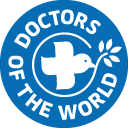Dr. Volodymyr knows every street, every house, every door in his community. He has been working here for 32 years, since he graduated from university.
“This is my home. My patients are here. My family is here. My relatives are buried here,” he says. When his patients are mentioned, he smiles with pride.
When he talks about them, a warm, proud smile appears on his face. When asked why staying is important to him, he frowns slightly in surprise, as if the question were unnecessary. “They’re not ‘patients’,” he says. “They’re my neighbors.”
He lives just one kilometer from the clinic. That means he’s always close in case of an emergency, but also always close to danger. Every Tuesday, he crosses a path others would avoid reaching the Ternuvate outpatient clinic. There, he cares for a population of nearly 3,000 people, including 400 who fled their homes.
Just 25 kilometers from the front line, in the Zaporizhzhia region, war is ever-present. It’s felt in every corner: the shelling, the unsafe roads, the fear of occupation. And now, with winter approaching, another enemy joins in, the cold. The clinic’s windows are broken. Without urgent repairs, it will be impossible to work there once temperatures drop drastically.
“It’s terrible,” he acknowledges calmly. But there is no resignation in his voice, only a quiet certainty, he will stay. Because in the midst of war, his place remains beside his neighbors.
“Cold can be as deadly as wounds,” he explains. Still, he has no intention of leaving. His commitment is as strong as his bond with the community.
His story is a reminder that even in the areas hardest hit by war, one person’s resilience can sustain the hope of thousands. With support of the EU Humanitarian aid, that commitment can become life.


